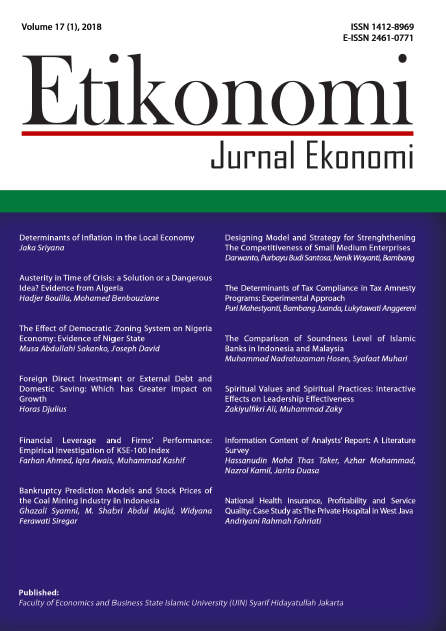The Effect of Democratic Zoning System on Nigeria Economy: Evidence of Niger State
DOI:
https://doi.org/10.15408/etk.v17i1.6592Keywords:
zoning system, economic growth, political economyAbstract
The introduction of the zoning system into Nigeria political space was to aid the smooth rotation of key political positions across the country. This policy is to achieve fairness, peace and equitable distribution of resource. Its adverse effect on the economy is thus something to worry about. Therefore, the study examines the effect of democratic zoning system on the economy of Nigeria, with special reference to Niger state. Employing descriptive statistics and multiple regressions. The results revealed that the elements of democratic zoning vis-à-vis; peace, equity, unity and justice has a positive and significant effect on the growth of the Nigeria economy. The authors thus recommends the government at both levels should focus on providing simultaneous development projects to pave way for peace and unity, zoning system should be incorporated into the Nigeria constitution, unbiased and equitable distribution of resources across the economy.
DOI: 10.15408/etk.v17i1.6592Downloads
References
Abubakar, D. (2004). Leadership and The Challenges of Rebuilding a Nation. In Agbaje, A., Onwudiwe, E., & Diamond, L. (Ed). Nigeria’s Struggle for Democracy and Good Governance: 153-166. Ibadan: Ibadan University Press.
Abrams, R. (1980). Foundation of Political Analysis: An Introduction to the Theory of Collective Choice. New York: Columbia Press.
Ademola, A. (2009). Ethnicity, Party Politics and Democracy in Nigeria: Peoples Democratic Party, PDP, as Agent of Consolidation?. Stud. Tribes Tribals. Vol. 7(1): 1-9.
Acemoglu, D., Naidu, S., Restrep, P. & Robinson, J. (2014). Democracy Does Cause Growth. NBER Working Papers No. 20004. Cambridge: NBER. Retrieved from http://www.nber.org/papers/w20004.
Agbaje, A. (1998). The Ideology of Power Sharing: An Analysis of Content, Context and Intent. In Amuwo, K., Agbaje, A., Suberu, R.T., & Herault, G. (eds.). Federalism and Political Restructuring in Nigeria: 121-136. Ibadan: Spectrum Books.
Agaptus, N. (2014). Power Rotation, Ethnic Politics and The Challenges of Democratization. Contemporary Nigeria. African Study Monographs. Vol. 35 (1): 31-40.
Akinola, A.A. (1996). Rotational Presidency. Ibadan: Spectrum Books Ltd.
Alesina, A., Özler, S., Roubini, N., & Swagel, P. (1992). Political Instability and Economic Growth. Journal of Economic Growth. Vol. 1 (2): 189-211. DOI: https://doi.org/10.1007/BP00138862.
Ayo, A., Olufemi, A., & Ajinde, O. (2012). Zoning Formula and the Party Politics in Nigerian Democracy: a Crossroad for PDP in 2015 Presidential Election. International Journal of Research on Humanities and Social Sciences. Vol.2 (4): 201-210.
Djezou, W.B. (2014). The Democracy and Economic Growth Nexus: Empirical Evidence from Côte d’Ivoire. The European Journal of Comparative Economics, Vol. 11 ( 2): 251-266.
Ezeibe, C., Abada, I., & Okeke, M. (2016). Zoning of Public Offices, Liberal Democracy and Economic Development in Nigeria. Mediterranean Journal of Social Sciences. Vol 7 (3): 328-337.
Helliwell, J.F. (1992). Empirical Linkages between Democracy and Economy Growth. NBER Working Paper series No. 4066. Cambridge: NBER. Retrieved from http://www.nber.org/papers/w4066.
Kabuk, V.S. (2015). Understanding the Politics of Zoning System in Nigeria: A Purview of Rawls’ Complex Egalitarianism. Bassey Andah Journal. Vol. 7 (8): 139-153.
Knutsen, C.H. (2012). Democracy and Economic Growth: A Survey of Arguments and Results. International Area Studies Review. Vol. 15 (4): 393-415. DOI: https://doi.org/10.1177/2233865912455268.
Narayan, P.K., Narayan, S., & Smyth, R. (2011). Does Democracy Facilitate Economic Growth or Does Economic Growth Facilitate Democracy? An Empirical Study of Sub-Saharan Africa. Economic Modelling. Vol. 28 (3): 900-910. DOI: https://doi.org/10.1016/j.econmod.2010.11.004.
Omoleke, I.I. (2010). The Problem of Primordial Factors and National Building. In Mangut, J., & Egbeto, D.O. (Ed). The Fourth Republic and National Integration in Nigeria, 1999-2009. Makurdi: Aboki Publishers.
Pye, L. (1996). Aspects of Political Development. Boston: Little Brown.
Rachdi, H., & Saidi, H. (2015). Democracy and Economic Growth: Evidence in MENA Countries. Procedia - Social and Behavioral Sciences. Vol. 191: 616 – 621. DOI: https://doi.org/10.1016/j.sbspro.2015.04.644.
Radu, M. (2015). The Impact of Political Determinants on Economic Growth in CEE Countries. Procedia-Social and Behavioral Sciences. Vol. 197: 1990-1996. DOI: https://doi.org/10.1016/j.sbspro.2015.07.579.
Salahodjaev, R. (2015). Democracy and Economic Growth: The Role of Intelligence in Cross-country Regressions. Intelligence. Vol. 50: 228-234.
Tabassam, A.H., Hashmi, S.H., & Ur Rehman, F. (2016). Nexus Between Political Instability and Economic Growth in Pakistan. Procedia-Social and Behavioral Sciences. Vol. 230: 325-334. DOI: https://doi.org/10.1016/j.sbspro.2016.09.041.
Terna, I. (2014). The Principle of Zoning and Its Consequences on Political Development in Nigeria. Katsina-Ala Multidisciplinary Journal. Vol. 2 (1): 51-60.
Zouhaier, H., & Karim, K.M. (2012). Democracy, Investment and Economic Growth. International Journal of Economics and Financial Issues. Vol. 2 (3): 233-240.










